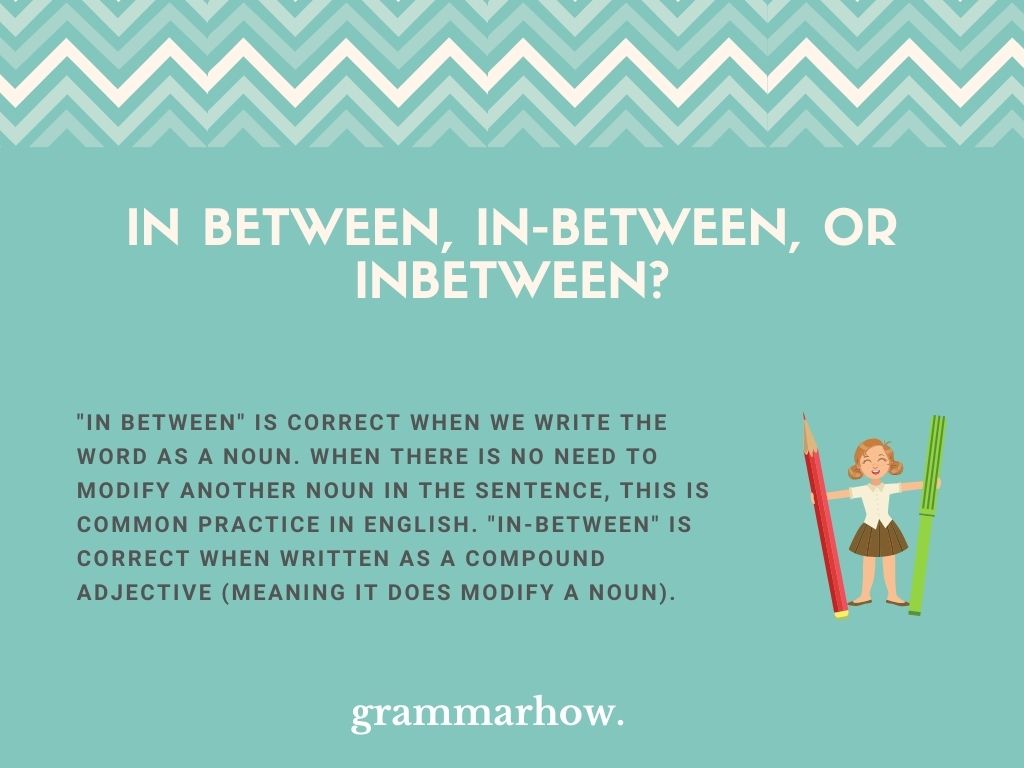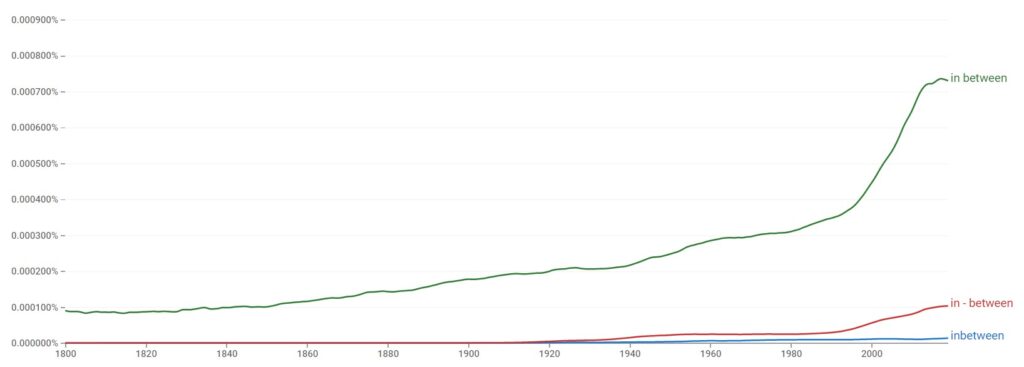“In-between” is a difficult word to understand. There seem to be conflicting rules about whether it’s hyphenated or split into one or two words. Don’t worry, though; this article will have all the answers to help you out!
In between vs. In-between vs. Inbetween
“In between” is correct when we write the word as a noun. When there is no need to modify another noun in the sentence, this is common practice in English. “In-between” is correct when written as a compound adjective (meaning it does modify a noun).

According to Google Ngram Viewer, “in between” is by far the most popular spelling choice of the three that are available. The hyphenated form, “in-between,” also sees some use, but it’s not nearly as common in writing.

In The Cambridge Dictionary and the Oxford Dictionary, “in-between” seems to be the most common dictionary definition. However, when marked in a hyphenated way, it’s clearly stated that the word should be used as an adjective.
In both dictionaries, they also mention that “in between” is separated into two words when writing as a noun. It’s important to make this distinction before writing it.
As a quick, helpful tip, you can refer to these two examples:
- Noun: I travel to work on Mondays and Sundays, but sometimes I go in between.
- Adjective: The in-between contact with the person isn’t nearly as important as I thought it would be.
Is “Inbetween” One Word?
“Inbetween” is never written as one word. If you have seen it written in this way before, it is a simple typo or misspelling. You should not use it in this way because it is not grammatically correct as the noun phrase or the adjective form.
The following examples will help you to make a little more sense of the issues:
- Correct: I need to talk to his family and everyone in between the situation.
- Incorrect: Whatever color this is, it’s somewhere inbetween green and blue.
- Correct: The in-between house was set up for troubled teens who needed a place to crash.
- Incorrect: I don’t like to find out what’s inbetween the sheets!
Is “In between” Two Words?
“In between” works as two words when used as a noun phrase. In these cases, we write it to show that it is the noun that shows something is between two specific points. No other nouns are needed because nothing needs to be modified in the sentence.
Some people believe that the hyphen is necessary even in the noun phrase. There are conflicting arguments that native speakers make about this too.
However, if you follow standardized rules and follow stylebook guidelines, you should remember that nouns never need to be hyphenated (only adjectives do).
Check out these examples if you’re still confused:
- There is something in between good and bad about him, but I can’t figure it out.
- Whatever is in between these two things is what I’m trying to look out for.
- Can you tell me which of these is in between the other?
- He’s not quite fluent yet. He’s definitely somewhere in between fluency and a complete beginner!
Is “In-between” Hyphenated?
“In-between” is hyphenated when used as an adjective. However, it is not a particularly common adjective to come across because we don’t often see nouns coming after it. Still, if you do use a noun directly after “in-between,” you must hyphenate it.
Here’s how it works:
- I’m at the in-between stages of growth right now. I’ll get there in my own time.
- You’re in the in-between house, which is where we take people when they need help.
- When can I speak to the in-between reporter about what I want to be said in this press conference?
- This is one of those in-between colors, and I don’t know how to describe it!
Is “Between” Capitalized In The Word “In-Between”?
You do not need to capitalize “between” in the hyphenated phrase because it is not a proper noun. Even if you start the sentence with the word, it does not make sense to capitalize it. However, you might find it useful to capitalize the word in a title.
Even though the hyphenated form is one word, it still makes sense to capitalize it when other words within the title are capitalized. You can still treat the individual components of the hyphenated words separately.

Martin holds a Master’s degree in Finance and International Business. He has six years of experience in professional communication with clients, executives, and colleagues. Furthermore, he has teaching experience from Aarhus University. Martin has been featured as an expert in communication and teaching on Forbes and Shopify. Read more about Martin here.

